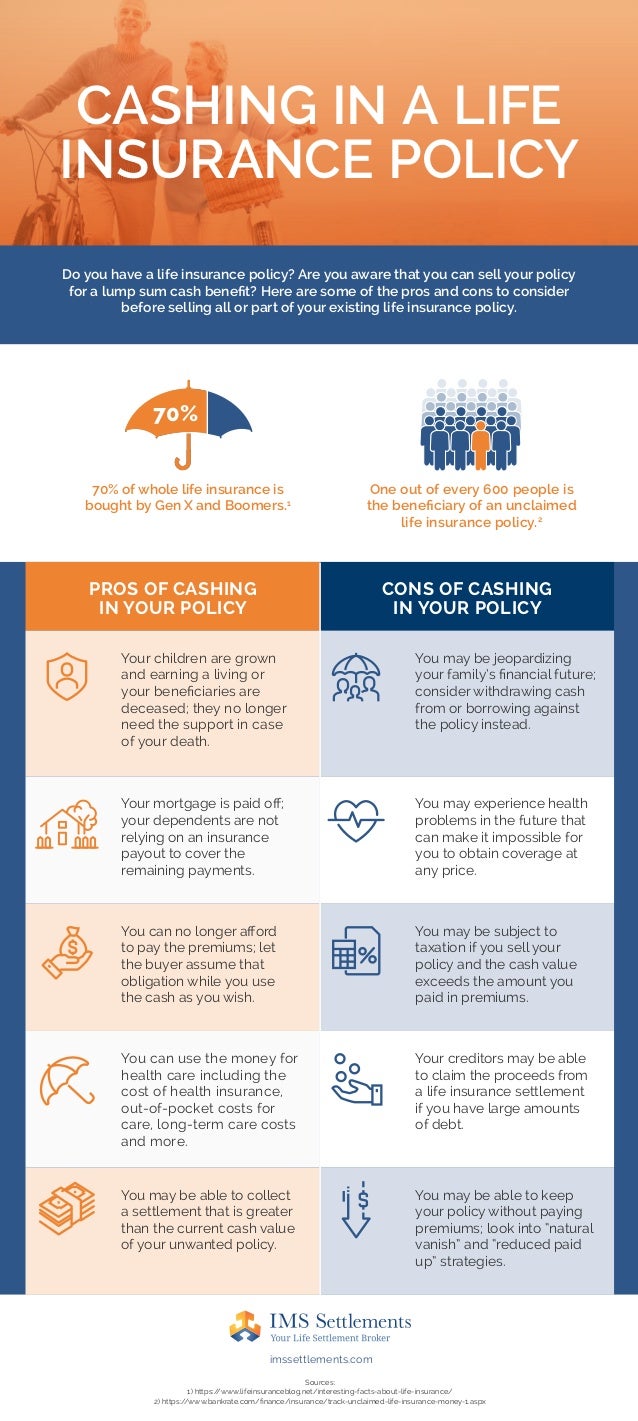The Pros and Cons of Cashing in Your Life Insurance Policy
Is it a bad idea to cash in your life insurance policy? Here are the pros and cons—-and everything else you need to know.
Did you know that you can sell your life insurance policy for a lump sum amount?
You sure can. However, it’s important to point out that cashing in your life insurance policy is something that you should do only when it no longer makes sense to keep it.
In this article, I’ll explain why and when it is ideal to cancel and cash in your policy (and when it isn’t) along with a couple of alternative ways you can get money from it without the need to cancel it completely.
It’s important to point out that this concept only applies to permanent life insurance. Unlike term life, permanent life insurance policies (whole life, universal life, variable life, etc.,) feature cash value which is what you’re basically cashing in.
However, there is a term life insurance policy called Return of Premium that lets you get back what you paid if you outlive the policy. However, it doesn’t exactly work the same way in which you would cash in a permanent life policy. For our purposes, this will focus on life insurance policies which feature cash value.
Scenarios Where You Can Consider Cashing in Your Life Insurance Policy
I mentioned in the intro that you should only consider cashing in your policy if you’re absolutely certain that you no longer need it or badly need the money (after exhausting other options). And the reason is this: you’ll be compromising your family’s financial security if you are uninsured.
However, there are a couple of valid reasons why anyone would still want to cancel an existing policy. Here are some of the most common examples.
Your children are all grown up and earning a living/no longer need the financial support
One of the main reasons why we buy life insurance is to make sure that the people we leave behind will have the financial support to fund their daily and future living expenses. Having the ability to continue their education even at the absence of the family’s breadwinner saves the family from getting into too much debt or being forced to stop schooling altogether.
But, if your children are all grown up and already have their own jobs, the need for a lump sum benefit wouldn’t be as crucial. Let’s say you purchased a whole life insurance policy when your son was 10 years old. Now that he’s 25, with a nice-paying job and thinking of having a family of his own, the idea of cashing in the insurance might not be so bad.
Aside from getting unburdened with the monthly payments, you will also have some money to get back from the policy. You can use this money for personal expenses or invest it to further add on to your retirement funds.
Or as an alternative, you can purchase a cheaper term life policy that will last you until retirement. This way, you’ll still have considerable savings from the reduced premium payments. And, can still guarantee some benefit for your loved ones.
Your mortgage has been paid off
Another reason why people purchase insurance is to cover remaining payments on their mortgage. If you’re married but don’t have kids or have older children, you may consider cashing in on your policy. That is, of course, you’re certain that your family will no longer need the lump sum benefits in the event of your death.
Permanent life insurance promises a lifetime of protection plus cash value savings but with a more expensive premium as a trade-off (versus term insurance). If the monthly obligations are becoming too-much of a burden, then perhaps you can consider cashing in your policy. And get a cheaper term life policy instead.
Switching to a less expensive term will ensure you’ll remain protected but without the high premiums.
Retirement planning
Your retirement savings have grown considerably and you feel you have enough funds to cover your loved ones. The premiums you pay can instead be invested into your retirement fund and further boost your retirement income. This can be a great option for older policyholders. Especially to improve the quality of their lives during their golden years.
You’re able to self-insure
If you’re sitting in a particularly healthy amount of savings and feel that your needs have changed (kids are all grown up, you’re almost done paying the mortgage, etc.,) then perhaps you can cash in on your policy to further boost your savings. You can also use the lump sum and premiums to fund your health care expenses. This includes health insurance and other out-of-pocket health costs.
Long-term care costs across the US have risen dramatically over the last couple of years. If you feel that the combination of monthly premiums and payments for assisted living or nursing home care is too much of a burden, then cashing in on your policy might be a viable option.
You might be over insured
If you and your spouse own several life insurance policies (individual and group, for example), re-assessing your goals and current situation can give you an idea if some of your policies overlap and can be reduced/canceled in order to save on premiums.

Consider this scenario: You purchased a permanent life insurance policy when your first child was born. Five years later, you switch jobs and receive a great deal on a group benefit insurance. You realized some of the benefits overlap with your individual coverage so you reassess your situation.
Perhaps switching to a cheaper term policy with a couple of riders (missing on the group policy) might be a better idea? Then maybe you can put the savings you’ll get from the left-over premiums into your emergency funds/retirement savings?
You’re in debt/need money now
If you are saddled with debt and have been finding it really difficult to make ends meet, cashing in your life insurance policy will let you:
- get access to much-needed funds
- reduce your monthly expenses (remove premium payments)
When you have poor credit, have large financial commitments, and need the money for more urgent reasons, cashing in a policy is not such a bad idea.
You found a better deal that’s fit for your current situation
Even if you’ve had a policy for years, it’s still a good idea to shop around and see what others have to offer. Say you bought a permanent life policy 10 years ago when your daughter was born. You pay over a hundred dollars each month in premiums.
Due to changes in your circumstances, money is tight and you’ve been finding it really hard to cover the payments. Instead of letting the policy lapse, you decide to check out what other insurance companies have to offer.
Since you don’t really want to forego life insurance completely, you decide to switch to a much cheaper term life coverage. This way, you get to free up some of your monthly income for more crucial expenses. But you’ll still have the peace of mind of being fully-protected.
Disadvantages of Cashing in Your Life Insurance Policy
The above points are all valid reasons to cash in a life insurance policy. But it’s important to understand what you might be giving up when you let go of your life insurance. Here are some of the drawbacks of giving up your policy.
You may be endangering your family’s future
We purchase life insurance mainly to ensure that our loved ones will have some financial cushion when we pass away. This is highly important especially if you’re the primary breadwinner. Imagine leaving your loved ones without any means to support themselves—-it’s going to be very difficult for them.
Your children’s education will likely be jeopardized too. Not having the necessary income to pay for school is a big problem. Their quality of living will also be affected. And, they might even be forced to move out and live in a smaller house to cut on expenses, for example.
Instead of canceling the policy completely, you might want to explore some other options first (more on this later).
Say you decide to cancel your policy now but realize a few years later that you need it. Not only will you be assessed for higher premiums (since your older) but you might also acquire certain illnesses or health problems during the time you don’t have coverage—which can make it difficult and even impossible to get insurance at any price. You might be forced to get a guaranteed life policy as an alternative which comes with high premiums but small death benefits.
Taxes can be an issue
If your policy’s cash value is more than the amount you paid in premiums, you’ll likely be taxed if you sell the policy.
Risk from debt
If you have a considerable amount of debt, your creditors may be allowed to claim the proceeds you’ll get from the benefits.
Consider these alternatives before canceling your life insurance
Not having financial protection from lack of insurance can be a huge problem for you and your loved ones. If your main reason for canceling it is because of the inability to pay for premiums or you urgently need some money, consider the following options first.
Decrease the amount of coverage
Almost all life insurance companies allow its policyholders to change the benefit amount at least once. If price is your main reason for cashing in a policy, try to reduce the premiums first. This way, you won’t have to completely forego your family’s financial protection.
Borrow or take a partial withdrawal
Cashing in a life insurance policy for the sole purpose of getting money is typically not a good idea. It’s because whole life policies will let you take a loan or partially borrow from the cash value account. This isa better option in general versus canceling the entire policy for its cash value. With this method, you get to keep your coverage and still get some money for whatever you need it for.
Depending on how long you’ve had the policy and how much the cash value has gained, you may use it to fund the remaining premium payments. It’s one of the best features of a permanent life policy.
This is especially helpful if you’re in a financial bind and could use the money going to premium payments for more important expenses. Once you’re able to bounce back financially, you can arrange to go back to your regular payment setup.
If you’ve made a significant adjustment in your lifestyle that resulted in positive changes to your health, you might qualify for lower premiums. Reach out to your insurer and ask if you can request for a new medical exam. This could result in a significant decrease in your premium payments. Especially if you’ve made some remarkable improvements in your overall health (e.g quit smoking, lost weight, etc.,)
Conclusion
Cashing in your life insurance policy is not necessarily a bad decision. As you’ve seen above, there are various legitimate reasons why you may want to do so. The most important thing is to weigh your options very carefully. And, make sure to understand the consequences and trade-offs of your decision.
If you need help with this, you should reach out to a professional. They will assess your situation and provide you with the answers you need along with the best recommendations. Life insurance can be a tricky subject to navigate sometimes. So make sure to get professional help to avoid making costly mistakes.
Courtesy of IMS Associates
